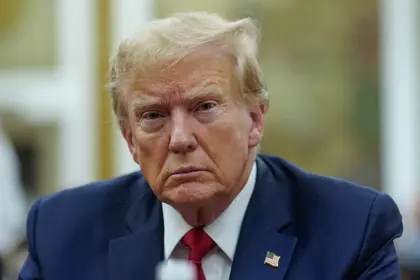The US Supreme Court reluctantly takes center stage in the 2024 White House race on Thursday as it decides whether Donald Trump should be barred from running again for president.
The nation's highest court is to hear arguments in the most consequential election law case since it halted the Florida vote recount in 2000 with Republican George W. Bush narrowly leading Democrat Al Gore.
JOIN US ON TELEGRAM
Follow our coverage of the war on the @Kyivpost_official.
The question before the nine justices is whether Trump is ineligible to appear on the Republican presidential primary ballot in the state of Colorado because he engaged in an insurrection -- the January 6, 2021 assault on the US Capitol by his supporters.
Colorado's Supreme Court, citing the 14th Amendment to the Constitution, ruled in December that Trump, the frontrunner for the 2024 Republican nomination, should be barred from appearing on the ballot because of his role on January 6.
Section 3 of the 14th Amendment bars anyone from holding public office if they engaged in "insurrection or rebellion" after once pledging to support and defend the Constitution.
The amendment, ratified in 1868 after the Civil War, was aimed at preventing supporters of the slave-holding breakaway Confederacy from being elected to Congress or from holding federal positions.
The 77-year-old Trump appealed to the Supreme Court to throw out the Colorado ruling and similar bids in other states to keep him off the ballot.
The conservative-majority court, which includes three justices appointed by Trump, has set aside 80 minutes for oral arguments but they are expected to go longer.

‘Europe Must Stand Up’ – EU Lawmakers Clash Over Trump’s Return, Musk’s Political Meddling
The Supreme Court has been traditionally loath to get involved in contentious political questions, but it finds itself thrust this year into the middle of the presidential race.
Besides the Colorado case, the court may also agree to hear an appeal by Trump of a lower court ruling that he does not enjoy immunity from criminal prosecution as a former president and can be tried on charges of conspiring to overturn the 2020 election.
- 'Outlier' -
Steven Schwinn, a professor of constitutional law at the University of Illinois Chicago, said whatever the court rules in the Colorado case "will be seen by some portion of the population as interfering with the election.
"If they disqualify Trump, Trump supporters will see that as interfering with the election," Schwinn said. "If they don't disqualify Trump, Trump's opponents will see that as interfering with the election."
Trump's attorneys, in their brief to the Supreme Court, said the "American people -- not courts or election officials -- should choose the next President of the United States."
"At least 60 states and federal courts throughout the country have refused to remove President Trump from the ballot," they said. "The Colorado Supreme Court is the lone outlier."
They urged the Supreme Court to "protect the rights of the tens of millions of Americans who wish to vote for President Trump."
Trump's attorneys said Section 3 of the 14th Amendment can only be enforced through "congressionally enacted methods" and not through the state courts.
Section 3 should also not apply to Trump because it refers to "officers of the United States" -- meaning appointed officials, they argued.
Furthermore, Trump's lawyers said, the former president "did not 'engage in' anything that constitutes 'insurrection.'"
"There was no 'insurrection,'" they said. "The events of January 6 were not an 'insurrection,' as they did not involve an organized attempt to overthrow or resist the US Government."
Trump delivered a fiery speech to thousands of supporters in Washington on January 6 before they converged on the Capitol in a bid to block congressional certification of Democrat Joe Biden's election victory.
He was impeached by the Democratic-majority House of Representatives for inciting an insurrection but was acquitted by the Senate.
You can also highlight the text and press Ctrl + Enter










